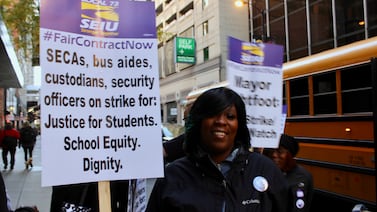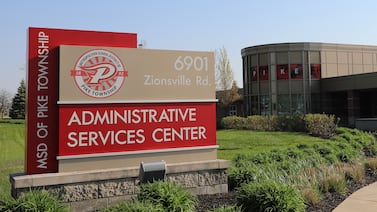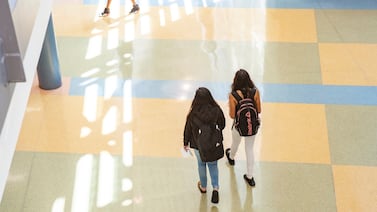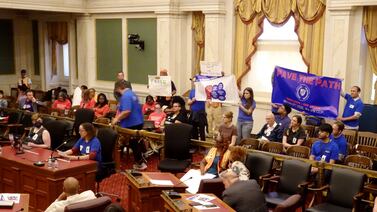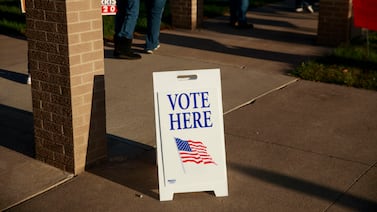This story has been updated to reflect new information.
A tentative New York City budget agreement announced Thursday restores funding to a handful of initiatives that Mayor Eric Adams initially nixed, including one focused on student mental health and another that provides child care subsidies to undocumented families.
The final agreement, which is being voted on Friday, holds the education department’s budget roughly steady at $31.5 billion. That’s a significant shift from the mayor’s April budget proposal, which called for a $30.6 billion budget for the city’s schools, nearly a $1 billion cut.
Officials said the final budget reflects several sources of funding that were not accounted for in the mayor’s April proposal, including $416 million in additional money from the state and $246 million in federal stimulus money that was initially set to be spent in a subsequent year. The budget deal also added $275 million for holding initial school budgets steady even if their enrollment drops and to pay for a slew of other “new needs.”
City officials did not immediately provide a full explanation of what the funding shifts will cover and official budget documents were not yet available.
Still, officials touted a number of programs that were spared from the chopping block. After an unusually chilly “handshake” agreement Thursday, City Council Speaker Adrienne Adams expressed frustration that negotiations centered on saving various initiatives.
“The council’s focus this year was to restore cuts to essential services,” she said, calling the mayor’s approach counterproductive and the result bittersweet.
The mayor downplayed the tension, saying negotiations are often contentious and the resulting budget is a “win for working-class New Yorkers.” The city’s overall spending has grown in recent years, with the latest agreement reaching about $107 billion.
Negotiators agreed to maintain funding to a few education-related programs, including one that connects students to mental health support and another that subsidizes child care for undocumented families. City officials credited higher-than-expected revenue, but cautioned that they believe tax growth may slow in the coming years.
The City Council must pass the budget by Saturday, the first day of the new fiscal year.
Here’s what to know:
Still unclear how individual school budgets will be affected
Although the education department’s overall budget is dipping, city officials pledged to keep individual school budgets steady — at least at first. Typically, funding depends on campus enrollment, which has been declining systemwide. But in recent years city officials have plugged school budget holes with federal funding.
Still, some schools’ budgets may shrink or grow, as the city takes back or adds money to campuses in the middle of the school year if their actual enrollment differs from projections. City officials have not made midyear cuts since the onset of the pandemic but have declined to say what they will do in the upcoming school year.
In response to a question Thursday, Mayor Adams said there is “no desire” to surprise school communities with midyear cuts but added, “there’s no guarantees in life.”
That uncertainty may lead some school leaders to tighten their belts if they anticipate anemic enrollment. Overall, the city is projecting a relatively small enrollment drop of 0.6%, suggesting deep cuts are unlikely on most campuses.
Funding restored to child care for undocumented families
The budget will include $16 million for Promise NYC, which covers up to $700 a week in child care for hundreds of low-income undocumented immigrant families. Adams had proposed cutting Promise NYC despite touting it in December when it launched.
The program used $10 million in six months to fully cover child care for about 600 children. Hundreds of more families are on waitlists, according to organizations running the program. Some newly arrived mothers told Chalkbeat that Promise NYC has allowed them to work and pursue education.
The $16 million included in the budget deal falls $4 million short of what immigration advocates and elected officials had sought. But it’s expected to continue covering the 600 children currently enrolled, city officials said.
Mental health support program saved at last moment
The budget includes $5 million for partnerships between schools and mental health clinics, creating a streamlined process for referring students to counseling. The money was initially left out of the mayor’s budget proposal.
The program, known as the Mental Health Continuum, includes just 50 schools. But amid growing concern about a slide in student mental health, advocates had pressed to save it and pointed out that the mayor’s own mental health plan highlighted the initiative.
The Mental Health Continuum is also meant to reduce 911 calls from school staff by training them to address students experiencing emotional crises. Those calls disproportionately affect Black students, and can result in handcuffing or unwarranted trips to the emergency room for psychiatric evaluation.
City to pilot extended hours for pre-kindergarten
The budget will include $15 million to change 1,800 to 1,900 seats for 3-year-olds so that they offer extended hours.
Many working parents need child care beyond 3 p.m. A survey by the Citizens’ Committee for Children, found one-third of more than 1,000 respondents said they were looking for child care from 8 a.m. to 6 p.m. However, there were 11,000 unfilled pre-K seats that had longer hours year-round, education department spokesperson Nathaniel Styer told Chalkbeat in May.
The pilot program will also extend beyond the school year, according to Speaker Adams’ office.
Caregivers “need preschool programs that align with their work days,” Mayor Adams said.
No plans to expand pre-K for 3-year-olds
The final budget reflects the mayor’s decision to halt a two-year $568 million expansion of preschool seats for 3-year-olds, instead opting to move seats to places with more demand, city officials confirmed.
Education officials have pointed to vacant seats: nearly 23,500 3-K seats are so far unfilled for next school year, according to department figures. The mayor’s decision has drawn backlash from City Council members and advocates, who say the city is not effectively recruiting families or funding early childhood education programs.
Questions remain about the mayor’s savings plan
As broad reductions to city agencies, the mayor required the education department to find hundreds of millions in cuts. It found $305 million, one of the largest savings, by recalculating spending on fringe benefits, such as health insurance for teachers. City officials have said those cuts would not reduce benefits to educators but reflected lower-than-expected growth in those costs.
But advocates worry that the city had already been using those savings to pay for other things, such as transportation, special education services, and charter school costs.
“We are concerned about where the DOE will find funding to pay for these expenses in the coming year and the impact on other programs and services that students need,” Randi Levine, policy director at Advocates for Children, wrote in an email.
City officials did not say whether other programs will face cuts.
Looking ahead: Concerns loom as federal dollars dry up
Future budget cycles are likely to be even more contentious, as federal relief funding dries up and city officials have to make difficult decisions about whether and how to continue programs that depend on those dollars.
Perhaps the most contentious decision will be whether to slash school budgets on campuses that have seen enrollment plunge but have been kept steady by temporary relief money. Mayor Adams had previously argued that school budgets need to be incrementally reduced to be brought in line with their current enrollment, but after instituting one round of cuts he faced intense criticism and has since backed away from making further reductions — for now.
The federal money supports a slew of other efforts including hiring more social workers and psychologists; expanding summer school programs; adding preschool seats for students with disabilities, a chronic shortage area; and increasing the number of schools that host wraparound services such as food pantries and health clinics. It’s not certain how these programs will be funded after this year.
Correction (Friday, June 30): A previous version of this story said the education department’s budget would likely decline by roughly $1 billion, a cut that was included in the mayor’s budget proposal in April. A City Hall spokesperson initially indicated that there were no major changes in the final budget deal. But after this story was published, officials said the final budget includes several funding streams that were not initially accounted for in the mayor’s earlier proposal, meaning the overall education budget will hold steady rather than face a cut. The headline has also been changed to reflect that.
Reema Amin is a reporter covering NYC public schools. Contact Reema at ramin@chalkbeat.org.
Alex Zimmerman is a reporter covering NYC public schools. Contact Alex at azimmerman@chalkbeat.org.



